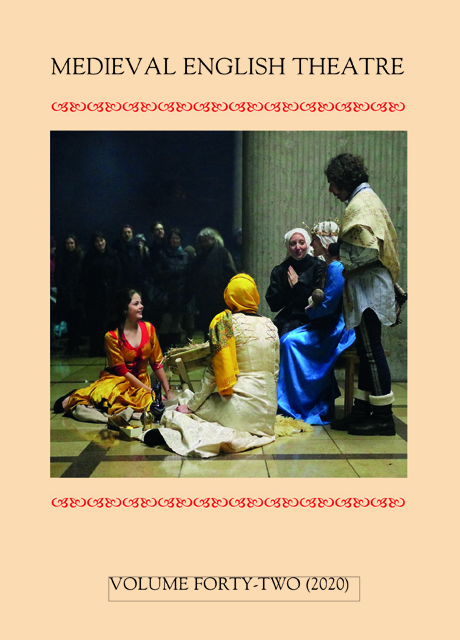Book contents
- Frontmatter
- Contents
- List of Illustrations
- List of Common Abbreviations
- Editorial
- Introduction: Reflections on the Medieval Convent Drama Project
- Fragments of Four Fourteenth-century Miracle Plays from Mont Saint-Michel
- Performing Female Authority: Convent Plays and Lay Spectatorship in the Barking Abbey Elevatio and Visitatio Sepulchri Dramatic Ceremonies
- Women in Religious Guilds: Performance and Community in Medieval and Tudor England
- When in Doubt: Thomas Indie and the Mid-sixteenth-century Reception of the Towneley Collection
- Taʿziyeh-khani in Iranian Communities: Muharram AH 1439 (AD 2017)
- Editorial Board
- Submission of Articles
Taʿziyeh-khani in Iranian Communities: Muharram AH 1439 (AD 2017)
Published online by Cambridge University Press: 17 January 2023
- Frontmatter
- Contents
- List of Illustrations
- List of Common Abbreviations
- Editorial
- Introduction: Reflections on the Medieval Convent Drama Project
- Fragments of Four Fourteenth-century Miracle Plays from Mont Saint-Michel
- Performing Female Authority: Convent Plays and Lay Spectatorship in the Barking Abbey Elevatio and Visitatio Sepulchri Dramatic Ceremonies
- Women in Religious Guilds: Performance and Community in Medieval and Tudor England
- When in Doubt: Thomas Indie and the Mid-sixteenth-century Reception of the Towneley Collection
- Taʿziyeh-khani in Iranian Communities: Muharram AH 1439 (AD 2017)
- Editorial Board
- Submission of Articles
Summary
Taʿziyeh-khani is a form of devotional theatre that centres on the commemoration of the martyrdom of Hosayn ibn ʿAli ibn Abi Taleb, the Third Imam of Shiʿi Islam and grandson of the Prophet Mohammad. At the centre of the taʿziyeh repertoire is a cycle of plays that portrays the events surrounding the battle of Karbala in the year AH 61 (AD 680), where Hosayn was killed while attempting an uprising against the Omayyad caliph Yazid ibn Moʿawiya (reigned AH 60–64 / AD 680–83). This event is of great religious importance to followers of Shiʿism; Hosayn’s sacrifice at Karbala and the cosmogonic significance of his martyrdom is comparable to that of Jesus Christ in Christianity.
The taʿziyeh’s Karbala cycle is loosely based on events described in historical sources, but has embellished them considerably through time, incorporating material from hagiographies and popular religious stories. These plays are evocative renditions of the sufferings of Hosayn’s supporters at Karbala as they are besieged in the desert and endure intolerable thirst, cut off from the banks of the nearby Euphrates. Seventy-two loyal followers are martyred for his cause, including his sons and brothers. The women and children of Hosayn’s family are then taken as prisoners to the Omayyad court in Damascus.
These performances both create a space for the Shiʿa to collectively remember their martyrs and serve a further important purpose: within mainstream Shiʿi belief, tears shed for the martyrs of Karbala are believed to have a redemptive quality; the plays are designed to provoke lament and thus to assist the shedding of redemptive tears. The deaths of Hosayn’s closest family members and most prominent supporters are traditionally represented in episodic form during the first ten to twelve days of the Islamic month of Muharram. The climactic play The Martyrdom of Imam Hosayn is performed on ʿAshura, the tenth day of Muharram (understood to be the date of Hosayn’s death). The cycle then treats the aftermath of the battle and the humiliation of the survivors as captives of Yazid’s forces. Taʿziyeh performances have been known to continue into the subsequent month of Safar, forming part of the rituals surrounding Arbaʿin, the fortieth day after the Imam’s death.
- Type
- Chapter
- Information
- Medieval English Theatre 42Religious Drama and Community, pp. 142 - 180Publisher: Boydell & BrewerPrint publication year: 2021



